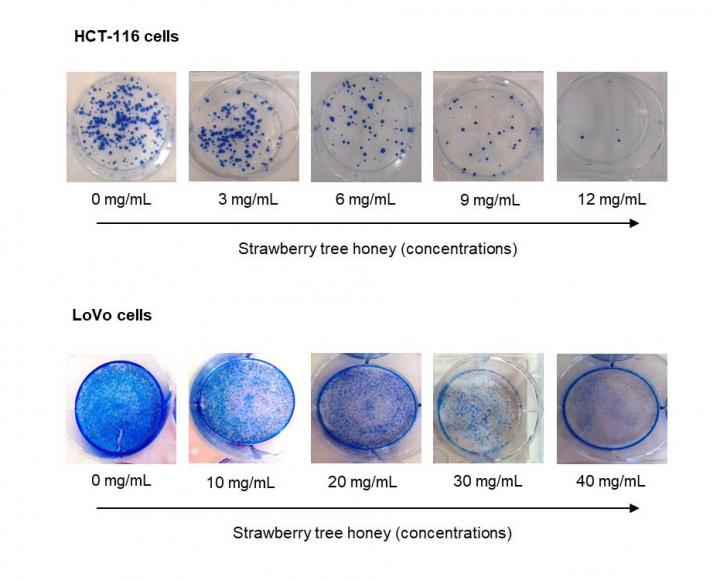
Credit: Afrin, S. et al.
Spanish and Italian researchers have proven that when honey from strawberry trees, a product typical of Mediterranean areas, is added to colon cancer cells grown in the laboratory, cell proliferation is stopped. The authors hope that these promising results and the anti-tumour potential of this food will be confirmed in in vivo models.
The honey extracted from the flowers of the strawberry tree (Arbutus unedo) is appreciated in the beekeeping sector for its organoleptic characteristics, especially for its strong bitter taste and dark colour. Now, scientists from the universities of Vigo and Granada (Spain) and from the Polytechnic University of Marche (Italy) have analysed for the first time the potential of this Mediterranean product to fight colon cancer.
The results, published in the Journal of Functional Foods, show that strawberry tree honey is capable of inhibiting the proliferation of tumour cells cultivated in laboratory plates – more specifically, those of a line of human colon adenocarcinoma (HCT-116) and another with metastatic characteristics (LoVo), widely used to investigate this type of tumour.
“Treatment with honey stops the tumour cells cycle by regulating some genes (cyclin D1, CDK2, p27Kip…); it inhibits cell migration, reduces the ability to form colonies and induces apoptosis or programmed cell death through the modulation of other key genes (p53, caspase-3, c-PARP) and various apoptotic factors,” says Maurizio Battino, coordinator of the research.
“It also suppresses the receptor of the epidermal growth factor called EGFR/HER2 and its signalling pathways, which could be an attractive target in cancer therapies because of their important role in the processes of cell survival and proliferation, as well as in those of apoptosis and metastasis.”
The cytotoxicity and anti-tumour effects of strawberry tree honey in relation to colon cancer lines increased with the amount and time of treatment. This led to other relevant results, such as the reduction of some transcription factors, the inhibition of the activity of certain enzymes and the decrease of mitochondrial respiration and glycolysis of tumour cells.
“None of these effects was observed when honey was applied to healthy cell lines,” the authors point out, noting the anticarcinogenic potential of this natural product, but insisting on the need for new studies with colon cancer in vivo models to confirm its chemopreventive effects.
“With these data it is not yet possible to speak of a cure or safe prevention of colorectal cancer thanks to strawberry tree honey,” emphasizes Battino, who adds: “This work constitutes a starting point in the effort to evaluate its possible biological and anti-cancer effects and indicates the main molecular mechanisms through which it exerts its effect, reinforcing the interest in the study and production of this Mediterranean foodstuff.”
“It is one more piece of evidence that a healthy, balanced and natural diet can provide bioactive compounds with possible interesting effects on the control and development of diseases as critical as this type of cancer,” concludes the researcher.
###
References:
Sadia Afrin, Francesca Giampieri, Danila Cianciosi, Francesca Pistollato, Johura Ansary, Mattia Pacetti, Adolfo Amici, Patricia Reboredo-Rodríguez, Jesus Simal-Gandara, Josè L. Quiles, Tamara Y. Forbes-Hernández, Maurizio Battino. “Strawberry tree honey as a new potential functional food. Part 1: Strawberry tree honey reduces colon cancer cell proliferation and colony formation ability, inhibits cell cycle and promotes apoptosis by regulating EGFR and MAPKs signaling pathways”. Journal of Functional Foods 57: 439-452, 2019. https:/
Sadia Afrin, Tamara Y. Forbes-Hernández, Danila Cianciosi, Francesca Pistollato, JiaoJiao Zhang, Mattia Pacetti, Adolfo Amici, Patricia Reboredo-Rodríguez, Jesus Simal-Gandara, Stefano Bompadre, Josè L. Quiles, Francesca Giampieri, Maurizio Battino. “Strawberry tree honey as a new potential functional food. Part 2: Strawberry tree honey increases ROS generation by suppressing Nrf2-ARE and NF-?B signaling pathways and decreases metabolic phenotypes and metastatic activity in colon cancer cells”.Journal of Functional Foods 57: 477-487, 2019. https:/
Media Contact
SINC
[email protected]
Original Source
https:/
Related Journal Article
http://dx.




